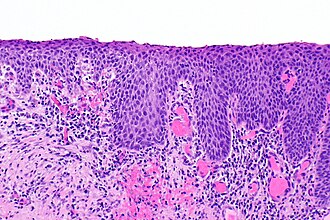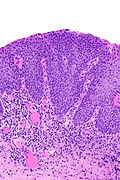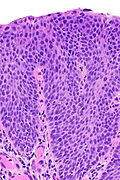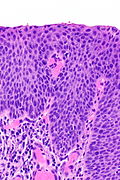Difference between revisions of "Penile intraepithelial neoplasia"
Jump to navigation
Jump to search
(+images) |
(→Microscopic: add micro descript.) |
||
| Line 39: | Line 39: | ||
==Microscopic== | ==Microscopic== | ||
Subclassified based on the role of [[HPV]],<ref name=pmid22641959>{{Cite journal | last1 = Velazquez | first1 = EF. | last2 = Chaux | first2 = A. | last3 = Cubilla | first3 = AL. | title = Histologic classification of penile intraepithelial neoplasia. | journal = Semin Diagn Pathol | volume = 29 | issue = 2 | pages = 96-102 | month = May | year = 2012 | doi = | PMID = 22641959 }}</ref> as in [[vulvar intraepithelial neoplasia]]: | |||
*Conventional PeIN (cPeIN). | |||
*Differentiated PeIN (dPeIN). | |||
===Classic penile intraepithelial neoplasia=== | |||
Features: | |||
*Increased [[NC ratio]]. | |||
*Multinucleation. | |||
*Lack of maturation to surface - not that useful. | |||
**May have "vertical streaming" - the long axis of the cells are perpendicular to the free surface & basement membrane. | |||
*Apical mitoses. | |||
DDx: | DDx: | ||
*[[Squamous cell carcinoma of the penis]]. | *[[Squamous cell carcinoma of the penis]]. | ||
=== | ===Differentiated penile intraepithelial neoplasia=== | ||
Features: | |||
* | *Thickening of the stratum spinosum ([[acanthosis]]). | ||
* | *Elongation of rete ridges with bridging/anastomoses between rete ridges. | ||
*[[Nuclear atypia]] - esp. of the basal layer. | |||
*Nuclei in stratum corneum ([[parakeratosis]]). | |||
*+/-Atypical mitoses. | |||
DDx: | |||
*[[Squamous cell carcinoma of the penis]]. | |||
*[[Squamous hyperplasia]]. | |||
*[[Lichen sclerosus]]. | |||
===Images=== | ===Images=== | ||
Revision as of 15:43, 22 July 2015
| Penile intraepithelial neoplasia | |
|---|---|
| Diagnosis in short | |
 Penile intraepithelial neoplasia. H&E stain. | |
| Subtypes | differentiated PeIN, classic PeIN |
| LM DDx | squamous cell carcinoma of the penis, squamous hyperplasia |
| IHC | p16 +ve (classic PeIN) -ve (dPeIN), p53 -ve (classic PeIN) +ve (dPeIN) |
| Site | penectomy grossing |
|
| |
| Associated Dx | HPV infection (classic PeIN), lichen sclerosus or BXO (differentiated PeIN) |
| Prevalence | uncommon |
| Prognosis | good |
| Clin. DDx | squamous cell carcinoma of the penis, lichen sclerosis, phimosis |
Penile intraepithelial neoplasia, abbreviated PeIN, is the precursor of squamous cell carcinoma of the penis.
It may be abbreviated PIN;[1] however, this can cause confusion with the prostatic intraepithelial neoplasia (the presursor of prostate carcinoma).
General
- Not very common overall.
- Typically seen adjacent to squamous cell carcinoma of the penis.
Microscopic
Subclassified based on the role of HPV,[2] as in vulvar intraepithelial neoplasia:
- Conventional PeIN (cPeIN).
- Differentiated PeIN (dPeIN).
Classic penile intraepithelial neoplasia
Features:
- Increased NC ratio.
- Multinucleation.
- Lack of maturation to surface - not that useful.
- May have "vertical streaming" - the long axis of the cells are perpendicular to the free surface & basement membrane.
- Apical mitoses.
DDx:
Differentiated penile intraepithelial neoplasia
Features:
- Thickening of the stratum spinosum (acanthosis).
- Elongation of rete ridges with bridging/anastomoses between rete ridges.
- Nuclear atypia - esp. of the basal layer.
- Nuclei in stratum corneum (parakeratosis).
- +/-Atypical mitoses.
DDx:
Images
IHC
- p16 -ve in dPeIN,[3] +ve in cPeIN.
See also
References
- ↑ Porter, WM.; Francis, N.; Hawkins, D.; Dinneen, M.; Bunker, CB. (Dec 2002). "Penile intraepithelial neoplasia: clinical spectrum and treatment of 35 cases.". Br J Dermatol 147 (6): 1159-65. PMID 12452865.
- ↑ Velazquez, EF.; Chaux, A.; Cubilla, AL. (May 2012). "Histologic classification of penile intraepithelial neoplasia.". Semin Diagn Pathol 29 (2): 96-102. PMID 22641959.
- ↑ Oertell, J.; Caballero, C.; Iglesias, M.; Chaux, A.; Amat, L.; Ayala, E.; Rodríguez, I.; Velázquez, EF. et al. (May 2011). "Differentiated precursor lesions and low-grade variants of squamous cell carcinomas are frequent findings in foreskins of patients from a region of high penile cancer incidence.". Histopathology 58 (6): 925-33. doi:10.1111/j.1365-2559.2011.03816.x. PMID 21585428.






